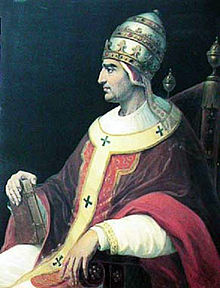Pierre Roger de Beaufort
|
Pope Gregory XI |
|
|---|---|
 |
|
| Papacy began | 30 December 1370 |
| Papacy ended | 27 March 1378 |
| Predecessor | Urban V |
| Successor |
Urban VI (Roman claimant) Clement VII (Avignon claimant) |
| Orders | |
| Ordination | 2 January 1371 |
| Consecration | 3 January 1371 |
| Created Cardinal | 29 May 1348 by Clement VI |
| Personal details | |
| Birth name | Pierre Roger de Beaufort |
| Born | c. 1329 Maumont, Limousin, Kingdom of France |
| Died | 27 March 1378 Rome, Papal States |
Pope Gregory XI (Latin: Gregorius; c. 1329 – 27 March 1378) was Pope from 30 December 1370 to his death in 1378. He was the seventh and last Avignon pope and the most recent French pope. In 1377, Gregory XI returned the Papal court to Rome, ending nearly 70 years of papal residency in Avignon, France. His death shortly after was followed by the Western Schism.
He was born Pierre Roger de Beaufort in Maumont in the modern commune of Rosiers-d'Égletons, Limousin, around 1330. The nephew of Pope Clement VI, he succeeded Pope Urban V at the papal conclave of 1370 and was the seventh and last of the Avignon Popes.
During his pontificate, vigorous measures (e.g., burning at the stake, confiscation of property) were taken against proponents of Lollardy, which had found acceptance in Germany, England, and other parts of Europe. Efforts were made to reform corrupt practices in the various monastic orders, such as collecting fees from persons visiting holy sites and the exhibiting of faux relics of saints.
Gregory confirmed a treaty between Sicily and Naples at Villeneuve-lès-Avignon on 20 August 1372, which brought about a permanent settlement between the rival kingdoms, which were both papal fiefs.
...
Wikipedia
